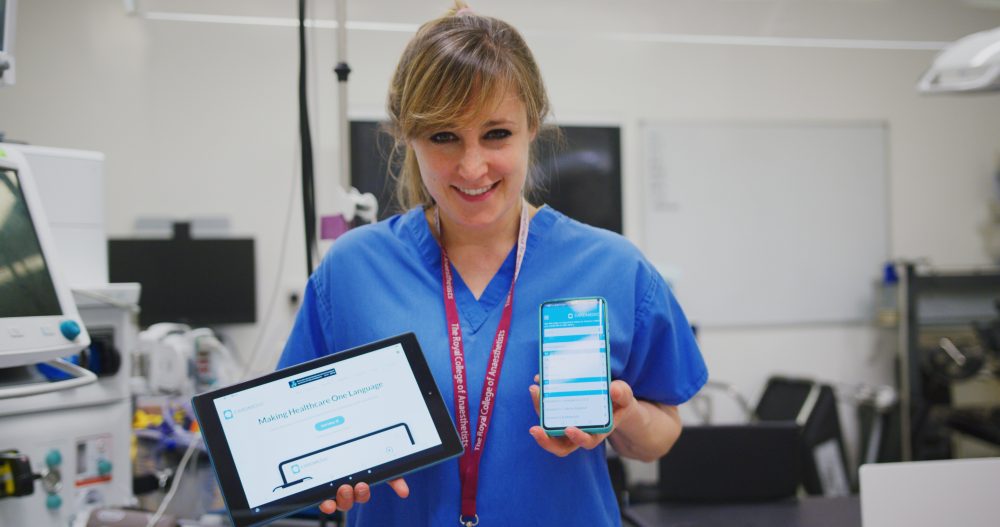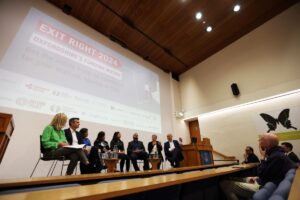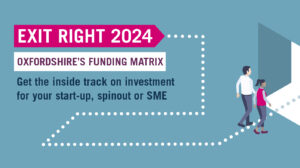Five Minutes with CardMedic’s co-founders Rachael and Tim Grimaldi
August 10, 2023

Award-winning healthtech start-up CardMedic has joined the community of pioneering science and tech companies in The Oxford Trust’s Oxford Centre for Innovation. We spoke to CEO Rachael Grimaldi and MD Tim Grimaldi, to find out more about their digital platform to aid communication between healthcare professionals and patients, and their fundamental quest to improve health literacy and healthcare.
CardMedic has created and built a unique digital library of ‘flashcards’, explaining standard medical procedures across various healthcare settings, to help overcome a range of communication barriers. Instead of, for example, desperately waiting for an interpreter to assist communication when care is urgent or scribbling notes in notoriously bad handwriting to help convey important information, healthcare practitioners now have CardMedic’s help at their fingertips to support better communication and patient care.
Emerging from the pandemic
The unprecedented demands of the Covid-19 pandemic amplified a number of challenges and exposed significant gaps in healthcare around the world. Communication challenges between healthcare professionals and patients were particularly exacerbated, as people were hidden and muted behind layers of personal protective equipment (PPE).
Rachael noticed this. With her clinical background as an anaesthetic registrar but locked down in the US on maternity leave, she avidly followed the news and unfolding developments about Covid. She says, in one particular news story, she was struck by the fear she observed in a patient who could not understand doctors. She reached out to colleagues and friends on the frontline of the pandemic to find out about how doctors were communicating with patients.
Rachael saw an immediate and obvious need for tools to support communication. And 72 hours from concept to launch, CardMedic was created. Its name was chosen for its simplicity, combining the two elements of flashcards and medical messages, and being easy to remember at a time when people were bombarded by complex health terminology associated with the pandemic.
Tim, with his background in e-commerce, digital branding and technology, set up a website. Rachael wrote the scripts. It started with notes most relevant to Covid-19 treatment, such as information to explain to patients they needed oxygen or to be put on a ventilator, but quickly expanded.
After being encouraged by a friend to join Twitter to share their endeavour, they were overwhelmed by the response and had 8000 users in 50 countries globally within three weeks. The word had spread. The need was global. And, with some additional media coverage helped by supportive advisors, CardMedic went global.
An ongoing need
PPE is only one of various barriers to communication. Others include language, sensory challenges such as hearing impairments, cognitive challenges due to learning disabilities or dementia, or simply poor health literacy which, Rachael explained, is a challenge for about 50% of the UK population. Successful communication often requires a third-party professional, which may be an interpreter, speech and language therapist or learning disability nurse. However, an interpreter can be difficult to find, particularly when needed urgently for emergency care. Therefore, all too often, friends and family, other staff (who may not be clinical), or machine translation are relied upon.
CardMedic’s platform now has over 1200 scripts covering 49 languages, plus sign language, and offers easy-read and read-aloud functions. Languages include those most widely spoken in the UK and US and those most difficult to find translators for, many of which have been requested by customers working with refugee and asylum-seeking communities.
Messages are straightforward and unambiguous, covering only one concept per message, without jargon. They offer various levels of simplicity of messages, pitched at reading ages six to eight years old, and with the option of images in the roadmap.
CardMedic’s digital platform is now used in 25 hospitals across 19 Trusts in the UK, an air ambulance service, a rural hospital in the US, and they have interest across the diverse Texas Medical Center in the US. They are quickly growing their customer base and embedding their platform in standard operating procedures in various healthcare settings. Over the next two to three years, they aim to expand to more hospitals. While they grow their commercial arm, the free tool they originally launched in the pandemic is still available and is accessed from 120 countries around the world.
Their entrepreneurship journey
Rachael and Tim have participated in various accelerator programmes, helping them access the support they have needed to grow their company and understand and navigate the UK and US healthcare environments.
In the UK, this has included Oxford University Hospital NHS Foundation Trust’s TheHill Accelerator, NHS Clinical Entrepreneurship Programme and NHS Innovation Accelerator. In the US, they have participated in the Mass Challenge Early Stage Accelerator, in which they won a Platinum Award with a $50,000 prize, and the MassChallenge Healthtech Accelerator, as well as the Texas Medical Centre Innovation Bootcamp and Accelerator programme.
A collective effort
Their team now consists of seven full-time team members, but Rachael and Tim acknowledge the many incredible volunteers with clinical, accessibility and digital expertise, including speech and language therapists and learning disability nurses, who gave their time to make the platform possible during the pandemic and beyond. Tim says, “It wouldn’t have happened without the support we’ve had. That collective effort has got us to where we are.”
As most of their team are based around Oxford and, with the proximity to the medical innovation in Oxford, the expertise and support, both the Oxford Trust’s Oxford Centre for Innovation and Wood Centre for Innovation make an ideal base from which they can build their business and presence in the UK.
Funding
Soon after starting up, CardMedic were the successful recipients of a highly competitive Innovate UK grant, and subsequently received a follow-on grant. They have received angel investment, of which 60% has been from clinicians, whose confidence, says Rachael, “is an accolade for what they are doing”. They are currently raising seed funding, building on a major investor in the US, and aim to raise series A funding next year.
Expanding the platform
CardMedic will be continuing development work on its products, aiming to integrate into electronic health records. The team is exploring diversifying their offering and looking at patient engagement and education beyond the immediate clinical environment, so that patients will be able to access information before or after clinical interventions or care. The platform also provides a useful training tool for students and clinicians, and is especially useful in settings where different specialties come together.
Rachael and Tim’s immediate aims are to connect with strategic partners, grow the base of customers in the UK and US, and then expand the multilingual platform globally, looking first to countries where the need lies most.
Social impact
Their ultimate vision is to become a content platform that improves health literacy, and so improves health outcomes. It is important to Rachael and Tim that their work has a positive social impact, and will set up the CardMedic Foundation to drive this. They hope their tools can continue to provide aids to refugee and humanitarian crises, and aim to support training for community health workers in refugee camps. They are also looking to fund female and healthcare entrepreneurs in developing countries.
You can find out more about CardMedic at: https://www.cardmedic.com/




